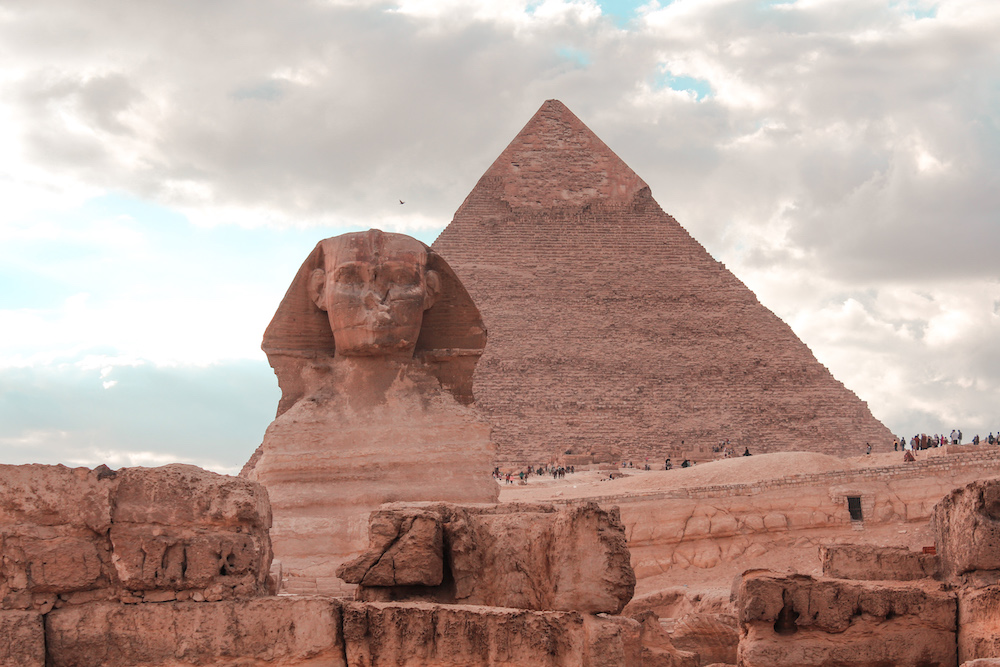How to Avoid Scams in Egypt
Egypt is one of the most fascinating destinations in the world, but it’s also one of the places where you’re most likely to get scammed. Here’s what you need to know about how to avoid scams in Egypt.
It’s easy to romanticize Egypt. You might dream of sailing down the Nile River on a traditional felucca boat, wandering through ancient temples, getting lost in maze-like markets, exploring tombs in the Valley of the Kings, and gazing at the Pyramids of Giza and the Great Sphinx. Sounds idyllic, right?
And it’s true that Egypt is an amazing once-in-a-lifetime destination. You can experience all of that and more in Egypt. It really is a spectacular destination that will fulfill your bucket list dreams.
But what that fantasy version of Egypt doesn’t include is the unfortunate reality that you’re likely to be hassled more or less nonstop from the moment you land in Egypt until the time you leave.
Why Are There So Many Scams in Egypt?
If you’re not careful, you can easily fall victim to one or more scams while in Egypt. And there’s nothing like a bad scam to make your dream trip turn into a nightmare. Although this is a destination where you definitely need to keep your guard up, I’m not saying this to scare you from going to Egypt.
Scams are just part and parcel when it comes to traveling in Egypt. I want to make it really clear first that not every Egyptian is a scammer. It’s a huge country of 111 million people, after all!
However, Egypt is a very poor country, and that definitely plays a part in why some Egyptians do try to scam tourists, who they perceive as being from wealthier countries. But to be honest, the poorest Egyptians are often the most honest ones who would never scam you. Unfortunately, it’s the most in-your-face people who are interacting with you in touristy areas that are more likely to try to scam you.
Egypt is still very much worth a visit, but you just need to prepare yourself and know what to expect. Be sure to read these tips before you go so you can avoid scammers ruining your trip to Egypt.
Common Scams in Egypt
Before I get into the tips for avoiding scams, let’s talk about common scams in Egypt.
Here’s a look at some of the most common scams you might encounter:
- Taxi scam where the driver doesn’t tell you a price beforehand and tries to charge you an exorbitant amount when you reach your destination (always agree on a price before you get in the car)
- The same scam but for tuk-tuks or boat rides — again, agree on a price in advance
- Overcharging you for an item in the markets (you should always haggle for a lower price)
- Fake tour guides at tourist destinations like temples or the Pyramids of Giza who will try to pressure you into taking a tour with them, which will end up costing you more than you expect
- Camel rides or horse rides, where they try to demand additional money from you at the end
- Anyone who offers to take a photo for you or with you — they will expect a tip afterwards
- People expecting tips for even more ridiculous things like holding the door open for you or handing you toilet paper in the bathroom (literally just say no — don’t get pressured into doing it)
- Pickpocketing, which is a classic scam you can fall victim to anywhere, including Egypt
- Fake ticket takers or employees, even inside attractions like temples or the Pyramids of Giza — just ignore anyone who is trying to get your attention, because they’re absolutely trying to scam you
- Restaurants without prices on the menu (always clarify the price before ordering)
- Anyone offering to show you around or escort you to where you’re going — they’ll expect money for it
- Being told the attraction you want to visit is closed today, or it’s not open to visitors when you know it’s supposed to be open (they’ll offer to take you somewhere else instead — scam!)
Hopefully, this gives you an idea of what to look out for when it comes to scams.
Tips for Avoiding Scams in Egypt
Unfortunately, as I’ve already mentioned, scams abound in this country. You can’t avoid people attempting to scam you. For visitors who come unprepared, this can easily make your trip to Egypt less enjoyable. But if you just accept it as part of traveling in Egypt, you’ll have a better experience.
Once you know what to look out for, you can prepare yourself to deal with these scam attempts.
Here are some tips for avoiding scams on your trip to Egypt…
1. Don’t trust anyone’s intentions.
I realize how pessimistic this sounds, but it’s the best way to avoid scams in Egypt.
Believe me, anyone who randomly approaches you in Egypt does not have good intentions. There’s an almost zero percent chance that you’re just going to have a nice encounter with a friendly local.
They might initially come off that way, but anyone who is trying to convince you to come into their store, hire them as a tour guide, or offer to give you directions is likely just trying to get money out of you.
Similarly, anyone who seems to be overly helpful — telling you you’re going the wrong way, that the temple you’re trying to visit is closed, that you need a guide to enter, or that you have the wrong ticket — is lying.
It’s absolutely possible to have authentic interactions with Egyptian people. But it’s not going to happen in any of the settings I just described above. So keep that in mind and you’ll be golden.
2. Get comfortable with being rude.
Scammers prey on tourists who feel obligated to be polite. One of the easiest ways to avoid getting scammed is to get comfortable with being rude. This kind of goes with what I was saying above.
You’re under no obligation to speak to anyone. If someone accosts you on the street, at a market, or inside a tourist attraction, you don’t have to give them a second of your time. And if you make the mistake of engaging with them, you will become their target and have a hard time shaking them.
Instead, cut them off right from the start. You can simply say “no” in a firm voice and keep walking. “No” in Arabic is “la” so you can also just repeat “la, la, la” as you continue walking. You can also just straight up ignore them and act as if they don’t exist. They’ll lose interest and find another target quickly enough.
Again, I realize this sounds kind of harsh. But this is a tactic I use to avoid being scammed or hassled anywhere in the world, not just in Egypt. Putting up a wall is simple and it almost always works.
3. Don’t fall victim to pressure tactics.
Scammers in Egypt are determined and persistent and they will use pressure tactics to overwhelm and disarm you. Don’t be surprised when you enter a market to hear dozens of voices calling out to you at once. They will try to get your attention with compliments, jokes, and other bold statements.
If you think you can just browse a market stall in peace, think again. Know that you’ll be immediately accosted and you’ll need to be firm that you’re just looking and don’t want to be bothered while you’re browsing. Once again, keep in mind that you don’t owe politeness to anyone.
If you aren’t interested, don’t let a salesperson rope you into listening to their spiel or watching a demonstration. Simply walk away. You also shouldn’t fall for any gimmicks like stores that are claiming to have a 50% off sale for one day only. Again, these are nothing but false pressure tactics.
Another common scam is telling you “Don’t worry, you can pay later” when it comes to everything from ordering off a menu with no prices to taking a taxi to arranging an activity like a boat ride.
You don’t want to ever do this. Firmly reiterate that you need to agree on a price in advance. Don’t allow yourself to be rushed along, or else you’ll be in for a nasty surprise when it’s time to pay.
4. Haggle in the markets.
If you do want to shop for souvenirs in Egypt, be prepared to haggle. This is genuinely part of the Egyptian culture, and it’s expected almost everywhere. Locals haggle, and so should you as a tourist.
When you ask for the price of something, make sure to clarify if it’s in Egyptian pounds or US dollars first. Once you’ve been given the price, you can start haggling. I recommend starting at about a third of what you’re originally quoted. Then you can go back and forth until you reach a satisfactory price.
Figure out what the maximum price you’re willing to pay is, and don’t agree to anything higher than that. For example, if you’re trying to get an Egyptian dress for 800 EGP (about $16 USD, which is a fair price) just keep saying “The most I can do is 800 pounds.” If it doesn’t seem like the shopkeeper is going to budge on the price, you can start to leave the store. This usually motivates them to agree to a fair price.
When paying, try to have exact change with you. Or if you need change back, you should not hand over the cash until you see the change you’re going to get and confirm it’s the right amount.
5. Agree to prices beforehand.
I’ve already touched on this, but you should definitely agree on prices beforehand if you’re taking a taxi or another form of transportation, such as a tuk-tuk or boat ride. This goes for animal activities too, like camel rides and horse rides. And it goes for any tours or other types of activities.
Personally, I do not recommend any animal activities in Egypt since they are almost always highly unethical. If you take a camel ride or horse ride, know that it’s almost guaranteed that the animals are not cared for properly. So simply avoiding animal activities in Egypt is an easy way to avoid scams.
But in any of these other scenarios, be sure you agree on a price beforehand to avoid unpleasantness at the end. You might also still find that you’re being asked to pay more or leave a large tip. In this situation, remain firm and pay what you agreed upon, but don’t pay any extra. Just walk away!
6. Travel with a guide or group tour.
I’m not someone who usually travels with a guide or as part of a group tour. As a solo female traveler, I’ve been to almost the entirety of Central America and South America by myself, and most of Europe too.
So while I am usually a big fan of independent travel, I have to say, Egypt is one of the few destinations I’ve been to where I truly think you’ll have a much better experience not doing everything on your own.
I really enjoyed traveling on a group tour in Egypt. I didn’t have to worry about any of the logistics like transportation between destinations, entry into tourist attractions, and figuring out where to eat, all of which would have been major friction points in Egypt, even for an experienced traveler.
It’s definitely possible to travel to Egypt independently and have a good time. But I think if you’re looking for the most hassle-free experience, I would recommend getting a guide or doing a group tour.
This is also what I recommend doing in my guide to solo female travel in Morocco. Morocco is a similar destination in terms of scams and hassling, although not quite as bad as Egypt.
How to Avoid Scams in Egypt
This guide showed you how to avoid scams in Egypt.
Like I said at the start, I don’t want to dissuade you from visiting Egypt at all. It’s an incredible destination! And most Egyptians are good people too. But sadly, the scammers can ruin it for everyone.
I’ve read lots of stories of people who ended up having a terrible time in Egypt. They never want to go back because they weren’t prepared and ended up falling victim to one or more scams while they were there.
Personally, I can’t wait to go back to Egypt one day. Every country has its downsides, and the constant hassling and scamming is definitely one in Egypt. But just come prepared and you’ll have a great time!
Related Guides:




